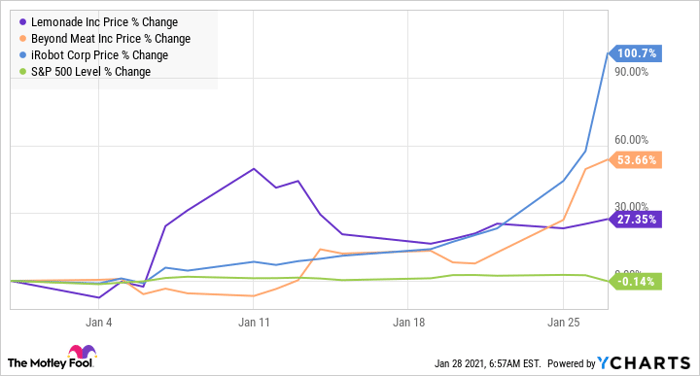This article was originally published on Fool.com. All figures quoted in US dollars unless otherwise stated.
Volatility is perfectly normal in the stock market. Long-term investors should acknowledge it, accept it, and (mostly) ignore it. However, the volatility we've seen over the last several days will likely be talked about by investors and analysts for years to come – the story behind the GameStop (NYSE: GME) short squeeze is truly historic.
How should investors prepare for a short squeeze? This question is particularly relevant to me at the moment. That's because I own three stocks that could be next on the short-squeeze list: insurance company Lemonade Inc (NYSE: LMND), plant-based meat company Beyond Meat Inc (NASDAQ: BYND), and home-cleaning robot manufacturer iRobot Corporation (NASDAQ: IRBT).
Here's what's going on in the market, why these three stocks could be next, and what I plan to do about it.
How did this even get started?
By now, I'll assume you've heard about the epic short squeeze of GameStop stock. Shares of the video game company were the most shorted on the market, with over 100% of the available shares being sold short.
Then members of a Reddit stock investing discussion group put their heads together and realised they could squeeze out these shorts if they cooperated on their trading actions. And what they did is working. Things are changing fast, but as of this writing, GameStop's stock price was up over 1,700% just this month.
It's likely that millions of GameStop shares are still being sold short (just at a different level from the initial sellers). So the stock could keep rising while more and more shorts get squeezed out.
That said, the music will end someday. And when that happens, as in a game of musical chairs, chaos could ensue and someone will be left without a seat (and plenty of stock price losses). GameStop's stock price will likely go back down, closer to where it was before.
It's what happened after the famous short squeeze of Volkswagen in 2008. Shares of Volkswagen are still down over 80% from those all-time highs, more than a decade later.
Why my stocks are next
Call the GameStop short squeeze a proof of concept. The Redditors' plan is working, which puts any stock with a lot of short-seller interest in their crosshairs if they intend to target new shorts. And three of my holdings make that list.
| Company | Short Interest (Percent of Float) | Days to Cover |
|---|---|---|
| Lemonade | 25.8% | 1.9 |
| Beyond Meat | 24.4% | 3.2 |
| iRobot | 65.1% | 20.3 |
Data source: Yahoo! Finance, Nasdaq.
Indeed, these short squeezes may have already started – all three stocks are crushing the market in January, as the chart below shows. It's possible they could shoot higher still. But after that, all three stocks could possibly tank back down to levels more in line with business fundamentals.
What investors should do
If my investing goal were to maximize my returns, I'd be scared stupid right now. But because I'm playing a different game, I can relax and do nothing.
Wait. Isn't making as much money as possible the point of investing? While that might seem like the goal, here's why that's a misguided idea. To truly maximize returns, you'd have to perfectly time the top for all your stocks, including during short squeezes. But data has shown time and again that that's impossible.
I'm playing a very different game. My goal is to see my investments return 15% annually over the long haul. Why 15%? Because I've done the math. Given my age, my current retirement savings, and the new money I add to my IRA regularly, 15% per year will be a good enough return to exceed my expected retirement needs.
I'd encourage you to do the math for yourself. You'd be surprised how quickly even a 10% return can compound your wealth. For that reason, I actually get excited after my stocks have a big run. I've initiated positions in all three of these companies over the last 13 months. The worst performer of this group is up 100% for me.
The way I see it, each could fall significantly in the aftermath of a short squeeze, and I'd still be ahead of my investing goals.
Here's the thing: I love the long-term investing thesis for each of these three stocks – it's why I own them.
I believe Lemonade can build a sizable and loyal customer base thanks to its unique revenue structure with clear incentives. Beyond Meat is a top-of-mind brand name at the forefront of a societal shift toward more plant-based products. And iRobot is a leader in the smart-home trend with a strong balance sheet and optionality for new product lines in the future.
There's no way I want to sell them now, even if there's a realistic chance for downside volatility from a short squeeze.
My reasoning for buying Lemonade, Beyond Meat, and iRobot still applies, making it a bad move to sell in my opinion. To prepare for possible volatility in your own portfolio, I recommend you do what I've done: Remember your goals and review the reason you bought each of your stocks. If everything is good, sit back and enjoy the ride.
This article was originally published on Fool.com. All figures quoted in US dollars unless otherwise stated.










